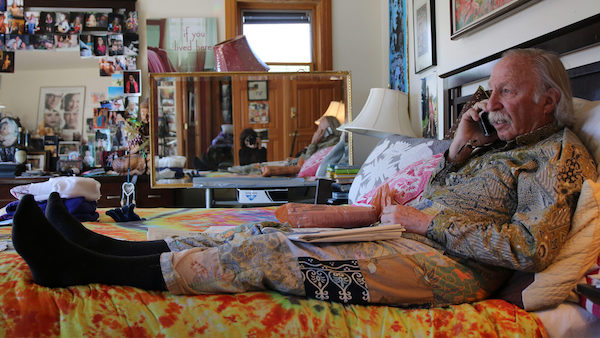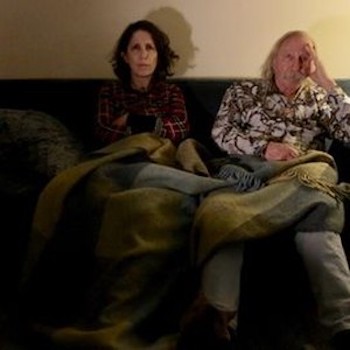Film Review: “Film About a Father Who” — Daddy Lessons
By Nicole Veneto
Rather than directly interviewing her father about his life, Sachs decided to take a more peripheral approach in order to figure out what makes her dear old dad tick.
Film About a Father Who, directed by Lynne Sachs, now streaming on The Criterion Channel.

Ira Sachs Sr., as seen in Lynne Sachs’s documentary Film About a Father Who. Photo:Cinema Guild
It goes without saying that the most influential relationship a woman will have with a man is the one she has with her father. Whether he’s completely out of the picture — a relationship defined by absence and/or neglect — or, in my case, a warm and supportive figure who calls you every day “just to hear your voice” (as mine says — and hi Dad, I know you’re reading this), fathers are the archetypal males upon which children shape their view of men. It’s one of the handful of observations Freud made about the human psyche that’s largely held up under further psychoanalytic scrutiny. Beyond providing half of our genetic makeup, fathers — of the neglectful as well as supportive variety — play a critical role in how we develop emotionally and psychologically into our adult years. Given that intimidating power, it’s oftentimes difficult to conceive of dads (and moms for that matter) as complex people who live individual lives outside of their parental significance.
Over 35 years in the making, experimental documentarian Lynne Sachs’s latest movie, Film About a Father Who, is a multisourced portrait of her father, Ira Sachs Sr., a self-described “hippie businessman.” It has been curated from an assemblage of 8mm home videos, VHS tapes, and newly shot footage spanning from 1984 through 2019. Rather than directly interviewing her father about his life, Sachs decided to take a more peripheral approach in order to figure out what makes her dear old dad tick. Instead, she converses with her siblings, mother, and paternal grandmother and reaches out to the myriad girlfriends, mistresses, and numerous half-siblings that her father kept her in the dark about for a good chunk of her life. Her intent is to sketch out the contours of her father’s life (and shine some light on a few secrets along the way) through exploring multiple perspectives. Along the way, Sachs constructs a multifaceted image of fatherhood and masculinity that reaches beyond a picture of immediate familial bonds; she examines how the same person can be different things to different people.
Given his reputation as “the Hugh Hefner of Park City,” Utah, and bohemian charisma, Ira Sachs Sr. would most likely have found himself the subject of a documentary with or without his daughter’s interest. With his flowing shoulder-length hair, thick gray mustache, and penchant for dressing in blue jeans and patterned shirts, Ira resembles John Carpenter — if the horror maestro turned to kicking back drinks in Margaritaville rather than making music in his retirement years (and, like Carpenter, Ira also enjoys smoking some reefer here and there). Having made a moderate fortune as a land developer financing hotels and ski resorts, Ira ensured that Lynne and the rest of the Sachs children would grow up materially well supported and loved. Lynne looks back upon her childhood with relative fondness, duly expressed via her her voice-over narration and the use of dreamy Super 8mm home movies from the family archives. This collage-esque approach brings to mind the work of the late queer feminist filmmaker Barbara Hammer, whom Lynne Sachs worked with and to whom she dedicated her short A Month of Single Frames, released the same year Hammer died of ovarian cancer.

Lynne Sachs and Ira Sachs Sr., as seen in Film About a Father Who. Photo: Cinema Guild
Despite her father’s easygoing, Deadhead demeanor, Lynne opines that there’s always been an emotional remoteness between herself and Ira, one which she describes as a disconnect in communication: “Dad had his own language, [and] we were expected to speak it. I loved him so much that I agreed to his syntax, his set of rules.” This emotional unavailability is the one constant of Ira’s character: it was felt by Lynne’s brothers and sisters, her mother, and Ira’s many girlfriends. According to one sibling, “He doesn’t lie … he just doesn’t tell you what’s going on.” He’s emotionally “selfish” when it comes to his dealings with different women, but can be incredibly “generous” to his wives, girlfriends, and their children. Ira’s biggest offense, though, is that he secretly had two other children with another woman, something Lynne and her many siblings (notably, she never refers to the children Ira had with other women as “half-siblings”) didn’t discover until 2016, thanks to a life insurance document.
Film About a Father Who subsequently serves as an overture toward those half-siblings whom Ira secretly kept from Lynne well into her adulthood. Lynne’s initial instinct wasn’t anger toward Ira about these undisclosed indiscretions, but an instinctual desire to meet and get to know the other children with whom she shares a father. This attitude is a testament to her ethos as a documentarian, though it is not entirely free of judgment. Lynne and her siblings speak plenty about how Ira’s decision to keep them all apart negatively affected them. But Lynne never makes Ira out to be a bad father or a deliberately malicious person. We all have skeletons in our proverbial closets; that’s what makes us human. The rationale for her dad’s secrecy is summed up by the statement, “There are things children don’t need to know about their dad.”
After watching Film About a Father Who, I texted my own dad to give him a heads up about what this review would be about and that I might reference our own relationship at some point. We may not see eye-to-eye on many things; in fact, growing up I sometimes felt he didn’t really understand me. Still, I’m incredibly fortunate to have a dad who’s a) a constant fixture in my life, and b) always making an effort to know me better. Nevertheless, I don’t know my dad’s personal life and emotional traumas as intimately as I know my mother’s. Men simply don’t make themselves emotionally vulnerable as readily as women do. There are things he’ll take to his grave with him, and that’s something I’ll have to come to terms with on my own.
Though not the best documentary I’ve watched this year, Film About a Father Who gave me a greater understanding of fatherhood, masculinity, and my own dad in the process. Perhaps we all have latent daddy issues, so the primary lesson this film teaches is valuable: dads aren’t infallible beings who need to snugly fit the conventional role of fatherhood.
Short Fuse podcast with host Elizabeth Howard talking to director Lynne Sachs about her work, particularly Film About a Father Who.
Nicole Veneto graduated from Brandeis University with an MA in Women’s, Gender, and Sexuality Studies, concentrating on feminist media studies. Her writing has been featured in MAI Feminism & Visual Culture, Film Matters Magazine, and Boston University’s Hoochie Reader. You can follow her on Letterboxd and Twitter for weird and niche movie recommendations.


This review has me intrigued and I’ll be looking to find the film online 👍